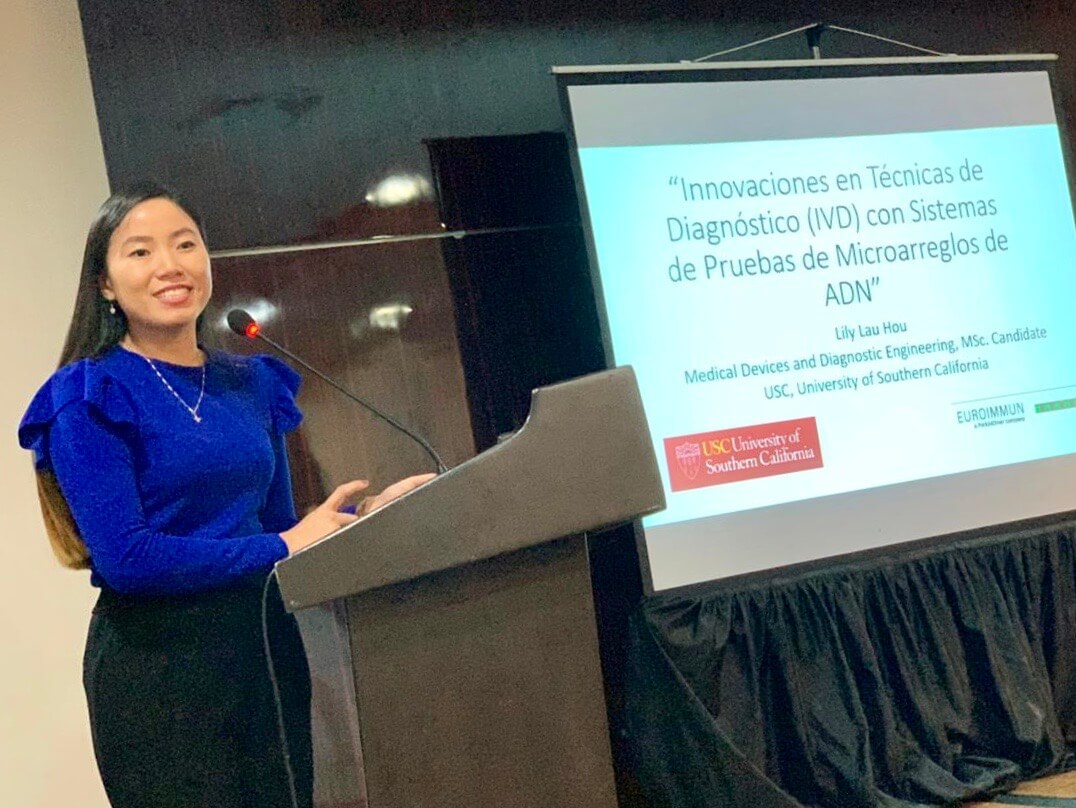Class of 2020 graduate, Lily Lau Hou is taking the skills from her M.S. in Biomedical Engineering to launch a startup and help the COVID-19 response in her homeland.
Lily Lau Hou has been taking great notes. The M.S. in Biomedical Engineering Class of 2020 graduate has been carefully studying healthcare best practices during her time at USC, so she can apply it in her home country of Panama, providing innovative diagnostic solutions for overworked medical professionals, particularly during the current COVID-19 crisis.
Originally from Panama City, Lau came to USC as a Fulbright Scholar after completing her undergraduate studies at the University of Toronto. She returned to Panama in March, just as global shutdowns began, and is already working on a project she hopes to turn into a biomedical startup, offering healthcare resources and advice to doctors. The first mission: to help expand COVID-19 antibody testing in her home country.
Lau said it was always part of her plan to go back home and make a difference in Panama.
“It was one of the things I was very inclined to do, because I felt the commitment to contribute what I have learned in my studies and to make a bigger impact in the healthcare system and in how research is seen here in Panama,” Lau said. “To really change what people think of biomedical engineering, healthcare and the importance of doing research with the right resources.”
Lau is currently focused on a project she’s planning to launch into a startup, in which she researches new technology and diagnostic solutions on behalf of healthcare workers and compares and contrasts options for them via webinar. It’s a project that is becoming particularly timely during this period of social distancing.
“Sometimes doctors don’t have the time to research new technologies and new techniques,” Lau said. “They don’t have the time to go to conferences, and I foresaw that I had the opportunity being in California within such a big network of hospitals and healthcare systems, I used that to leverage the resources and transmit that information to them.”

Lau presenting to medical professionals as a guest speaker at a conference in Panama.
The project is currently expanding into researching the COVID-19 serological (antibody) testing options for healthcare professionals, so that authorities in Panama might have a better understanding of how far the virus has spread throughout the population.
“Right now, within the market we’re seeing a lot of tests, and a lot of these are, for example, rapid diagnosis tests, which are not as effective because they don’t have the specificity and sensitivity required to identify the virus,” Lau said. “So what I’m doing is trying gather all this information together to find the best product within the market to provide solutions to the authorities, to doctors and related agents.”

Lau has been involved in volunteer and extracurricular work throughout her studies, and in 2019 she was awarded a Department of Biomedical Engineering Service Award.
Right now, Lau is managing a tricky feat: Trying to launch her biomedical career and her own startup in the midst of an unforeseen global crisis. But she said that for a small country, Panama had been managing the COVID-19 situation relatively well, with strict lockdowns keeping transmission under control.
“Nobody can go out except during a specific hour, according to your ID, so as a woman I can only go out Monday, Wednesday and Fridays,” Lau said. “Men can only go out on Tuesday, Thursday and Saturdays, and then Sunday, nobody can go out. So there’s minimal social exposure.”
She said the extra pressure that was on doctors and healthcare workers at the moment also allowed the government and community to fully appreciate the value of these workers, and the need to fully invest resources in the sector.
“I think this is a good opportunity for me to make a bigger impact,” she said.
Lau’s most recent project during her Master’s was focused on integrating innovative clinical laboratory tests and techniques for diagnosis, collaborating with Dr. Alan Hiti from the Keck School of Medicine of USC.
“I was able to contact doctors and healthcare professionals within USC, Keck Hospital, and LAC+USC Medical Center to fully understand how innovative clinical laboratory tests and techniques are integrated into the healthcare and medical systems to provide diagnosis,” she said. “This project is aimed to find the optimal way for this convergence, what factors to consider, and how to best cope with challenges.”
Lau grew up with a love of math and science; a love that has taken her around the world, even during her school days when she competed in an international physics olympiad in Chile.
Her strengths in both biology and math first drew her toward biomedical engineering, where she could finally see how her passion could be developed into an impactful career.
“What inspires me about biomedical engineering is the fact that I can use engineering principles to see challenges, and based on those challenges, to come up with new medical devices and new medical products that can satisfy that current needs of doctors, patients and consumers,” Lau said.
Stay Safe!!
